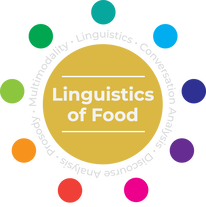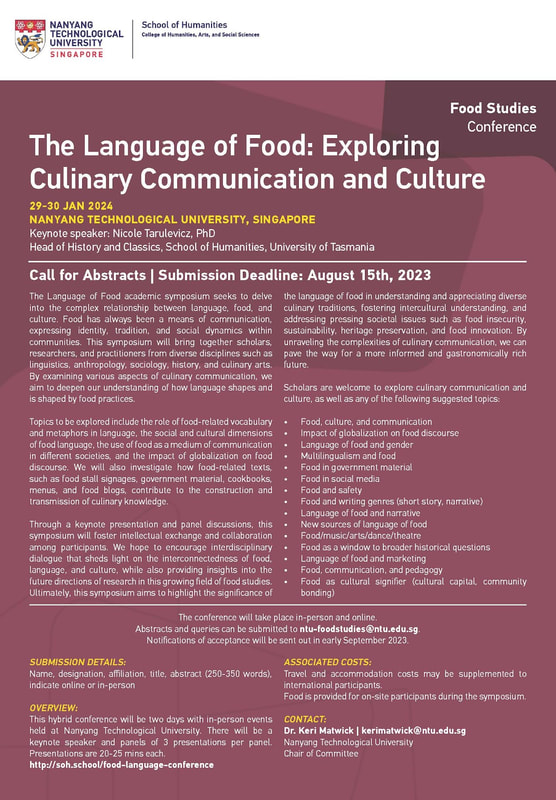Upcoming Symposium: The Language of Food, Nanyang Technological University, Singapore
CALL FOR ABSTRACTS: DUE AUGUST 15
CONFERENCE DATES: 29-30 JANUARY 2024
You are invited to submit your abstracts for an upcoming conference organized by the Food Studies interdisciplinary research cluster at the NTU School of Humanities.
The Language of Food: Exploring Culinary Communication and Culture
Keynote speaker: Nicole Tarulevicz, PhD
Head of History and Classics, School of Humanities, University of Tasmania
Details:
Date: 29-30 Jan 2024
Venue: Nanyang Technological University, Singapore, and online
Contact: Dr. Keri Matwick, kerimatwick@ntu.edu.sg
Learn more:
https://www.ntu.edu.sg/soh/news-events/events/detail/2024/01/29/research-events/the-language-of-food-exploring-culinary-communication-and-culture
https://sites.google.com/view/language-of-food/home
CALL FOR ABSTRACTS: DUE AUGUST 15
CONFERENCE DATES: 29-30 JANUARY 2024
You are invited to submit your abstracts for an upcoming conference organized by the Food Studies interdisciplinary research cluster at the NTU School of Humanities.
The Language of Food: Exploring Culinary Communication and Culture
Keynote speaker: Nicole Tarulevicz, PhD
Head of History and Classics, School of Humanities, University of Tasmania
Details:
Date: 29-30 Jan 2024
Venue: Nanyang Technological University, Singapore, and online
Contact: Dr. Keri Matwick, kerimatwick@ntu.edu.sg
Learn more:
https://www.ntu.edu.sg/soh/news-events/events/detail/2024/01/29/research-events/the-language-of-food-exploring-culinary-communication-and-culture
https://sites.google.com/view/language-of-food/home
About the Linguistics of Food ReN
This research network provides a space for researchers from interdisciplinary backgrounds to develop collaborative research within the linguistics of food. Building on an increasing global interest in food and eating studies, the network enables a focus on the cultural and social interactional issues around food, incorporating all forms of applied linguistic research. The aims of the network are to make more visible the diversity of linguistics research on food and to provide an interdisciplinary and cross-cultural meeting point for researchers in food and language studies.
Conveners
This research network provides a space for researchers from interdisciplinary backgrounds to develop collaborative research within the linguistics of food. Building on an increasing global interest in food and eating studies, the network enables a focus on the cultural and social interactional issues around food, incorporating all forms of applied linguistic research. The aims of the network are to make more visible the diversity of linguistics research on food and to provide an interdisciplinary and cross-cultural meeting point for researchers in food and language studies.
Conveners
- Marie-Louise Brunner: Trier University of Applied Sciences, Germany
- Jon Coltz: Saarland University, Germany
- Stefan Diemer: Trier University of Applied Sciences & Saarland University, Germany
- Keri Matwick: Nanyang Technological University, Singapore
- Marcelyn Oostendorp: Stellenbosch University, South Africa
- Polly Szatrowski: University of Minnesota, MN, USA
- Alla Tovares: Howard University, DC, USA
Get in touch. |
Coming up. |
|
Please send us a note if you are interested in joining the network (provide your name, affiliation, and research interests in the domain of language and food).
|
For upcoming activities, particularly food-related conferences, see our Calendar page.
|

